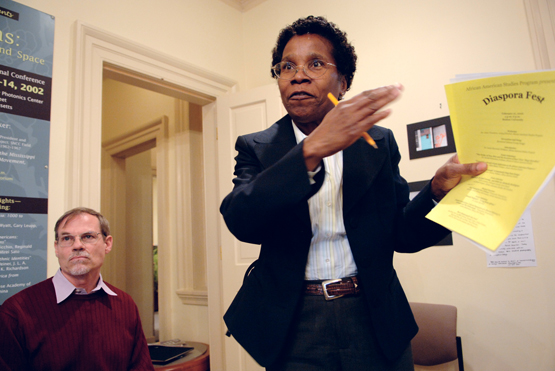Slavery: Celebrating the Beginning of the End
Friday symposium to commemorate closing of U.S.-Atlantic slave trade

Last year, Linda Heywood, a College of Arts and Sciences professor of African-American studies, gave several talks at the University of London as part of the United Kingdom’s commemoration of its abolition of the slave trade 200 years earlier. The anniversary was celebrated in newspaper and television reports throughout the British Isles, Heywood says.
“When I came back, I was looking for language about the commemoration of the ending of the U.S.-Atlantic slave trade in 1808, but I didn’t hear it,” she says. “And I was quite disappointed.”
So she and her husband, John Thornton, also a CAS professor of African-American studies, decided to do something. The result: a three-part symposium, starting tomorrow and unfolding over the next several weeks, marking the 200th anniversary of the end of American importation of African slaves. Despite the pledge of equality and the pursuit of happiness in the Declaration of Independence in 1776, the U.S. Constitution, written 11 years later, had allowed the slave trade to continue until 1808 as a concession to southern states. When that period of time was over, Congress did ban the importation of slaves, effective January 1, 1808.
“The 200th anniversary is something we should note, in the process by which Africans and African-Americans became Americans,” says Heywood, currently a fellow at Harvard University’s W.E.B. DuBois Institute for African and African-American Research. “It didn’t happen with the end of the Atlantic slave trade, but that was one step that would lead eventually to the Civil War and the end of the institution of slavery with Lincoln.”
Experts and historians from as far as UCLA and as near as Harvard University will convene at BU’s Florence & Chafetz Hillel House on Friday, April 11, Thursday, April 17, and Thursday, May 1, to discuss aspects of the slave trade and the impact of the importation ban on political, economic, and social life in the United States. On Friday, Thornton and Heywood will talk about the ethnicities that comprised the African slave population, and Steven Deyle, an associate professor of history at the University of Houston, will explore the impact that the closing of the African slave trade had on the power structure in America. Walter Johnson, a professor of history at Harvard, will tackle the Southern movement to reopen the Atlantic slave trade. David Eltis, the Robert W. Woodruff Professor of History at Emory University, will discuss the open-access databases that chronicle the journeys of tens of thousands of slave ships.
“We thought something should be done somewhere about the anniversary,” Thornton says. “And we thought BU should be at the forefront of commemorating events that were for the good of the nation.”
In the late 1700s and early 1800s, England led the way in the abolition movement, with grassroots activists applying increasing pressure on Parliament until the British slave trade was abolished in 1807. By 1838, the institution of slavery itself was outlawed in the United Kingdom. In the United States, a ban on slave importation went into effect in 1808, the soonest allowed by the Constitution, but the American abolition movement didn’t pick up steam until decades later. That difference, Heywood and Thornton say, helps explain why Congress has not passed a resolution marking the occasion and why the public remains largely unaware of the historical turning point.
“In the United States, the 1808 ban was a political statement that was made 20 years before as part of a policy for framing the new nation,” Heywood says. “It wasn’t really, ‘Let’s think about the humanity of this trade.’ It wasn’t done in that context.”
In fact, the internal trade continued unabated, she says, with the upper South feeding the lower South. Illegal shipments of African slaves continued to reach American shores, as well.
“When we talk about the commemoration of the 200th anniversary of the end of Atlantic slave trade, we think that the trade is all finished,” Heywood says. “So for me this is also a commentary about history — that we should not look at dates but at what’s actually happening on the ground.”
The three-part symposium 200th Anniversary of the Ending of the U.S.-Atlantic Slave Trade starts Friday, April 11, at 9 a.m. The next event, featuring Ira Berlin, Distinguished University Professor in the University of Maryland’s history department, takes place on Thursday, April 17, at 5 p.m. The concluding talk, by Gary Nash, a professor of history at UCLA, is on Thursday, May 1, at 5 p.m. All events will be held at the Florence & Chafetz Hillel House, fourth floor, 213 Bay State Rd. The symposium is cosponsored by the Boston University African Studies Center, Latin American Studies Program, Women’s Studies Program, Howard Thurman Center, and Office of the Dean of Students. The event is free and open to the public. For more information, call 617-353-2795.
Caleb Daniloff can be reached at cdanilof@bu.edu.
Comments & Discussion
Boston University moderates comments to facilitate an informed, substantive, civil conversation. Abusive, profane, self-promotional, misleading, incoherent or off-topic comments will be rejected. Moderators are staffed during regular business hours (EST) and can only accept comments written in English. Statistics or facts must include a citation or a link to the citation.